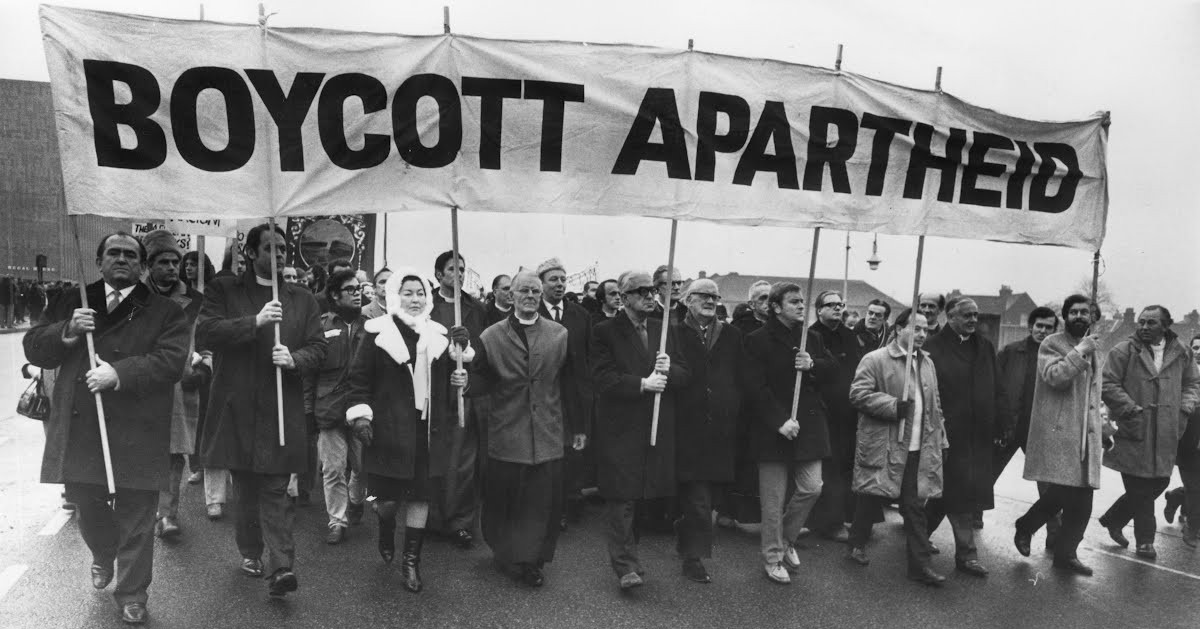South African scholar Derek Attridge on the role the academic boycott played in compelling white South Africa to recognize what a pariah the country had become in every walk of life.
anti-apartheid-march.jpg

Anti-apartheid marchers on their way to Twickenham rugby ground in London, December 20, 1969 (Photo: Getty Images)
Throughout the month of May, members of the Modern Language Association, the largest professional society of humanities scholars in the United States, will be voting on a resolution which—in contrast to other scholarly associations—seeks to ban the association from endorsing of the Palestinian call for a boycott of Israeli academic institutions. The Resolution was passed by the Delegate Assembly, the representative body of the membership, in January 2017, and now goes to the full membership. As many critics of the resolution have noted, it seems odd to put forward a resolution banning endorsement of a boycott resolution that is no longer on the table; it is equally odd to seek to close off debate on the issue in the name of preserving dialogue, as the resolution under consideration does. It is, effectively, an assault on MLA members’ freedom of speech, aimed at silencing the Palestinian struggle for justice and emancipation. During the 1980s, to its undying disgrace, the MLA rejected a resolution that would have supported the divestment and boycott movement against South African apartheid. In this essay, formerly South African scholar and MLA member Derek Attridge affirms the value of academic boycott in that struggle and points to the connections between the South African divestment campaign and the current BDS campaign. – David Lloyd, Distinguished Professor of English at the University of California, Riverside
As a South African living in the UK during the 1970s and 1980s, I supported the boycott of my original country’s academic institutions, a boycott being undertaken at that time in conjunction with actions in a number of other spheres, including economic, financial, cultural and sporting. The black opposition in South Africa supported these boycotts, as did a number of white academics within the country.
I don’t want to suggest that the academic boycott was a major force behind the ending of apartheid and the institution of democracy in 1994, but it did play a part in compelling white South Africa to recognize what a pariah the country had become in every walk of life. In particular, academics who supported the government – and there were many, alas – could not pretend that they worked in a realm somehow untouched by the daily injustices that scarred the lives of millions around them.
Some academic organizations in the UK continued to do business with the white universities in South Africa (higher education, like all education, was segregated), and it was a somewhat pathetic sight when professors – sometimes funded by the apartheid government – jetted off on trips to the country to enjoy wine and safaris while sports teams, performers, banks and many others observed the boycott.
Of course, those professors had their arguments, the same arguments I am constantly hearing today by those who oppose BDS – most recently by members of the Modern Language Association who wish not only to refrain from boycotting Israeli institutions but to persuade the organization to vote against any support for BDS.
We heard then, and we hear again today, of the worthy academics who will suffer (notwithstanding the fact that the boycott is of institutions complicit with systemic injustices), of the importance of dialogue (which did nothing to advance the cause of justice in South Africa), of the irrelevance of politics to academic pursuits (in spite of the intrusion of politics into the daily life of black South African academics and students then, and Palestinian academics and students now). Why single out South Africa?, we were asked, as if there weren’t particularly strong historical and economic links between the UK and its former colony, as there are between the USA and Israel – and as if one right was worse than no right at all.
The South African government invested considerable resources in promulgating these arguments abroad, for a time with considerable success. The Israeli government is no slouch on the propaganda front, either. The tide against the inhumanity of apartheid could not be stopped, however; too many people around the globe perceived that an unjust system was producing suffering day-in and day-out for millions whose only crime was their race. Events showed how wrong the arguments against the boycott were: the international movement encouraged black South Africans in their opposition to apartheid, and caused at least some white South Africans to undergo a change of heart.
The stronger the BDS movement is, the more likely change will come to Israel; it will not come if organizations like the MLA vote against supporting the Palestinians who, like the disenfranchised in South Africa in the era of apartheid, are the ones whose call for a boycott deserves to be heeded.
Derek Attridge is a South African-born British academic in the field of English literature and a current Professor of English at the University of York
No comments:
Post a Comment